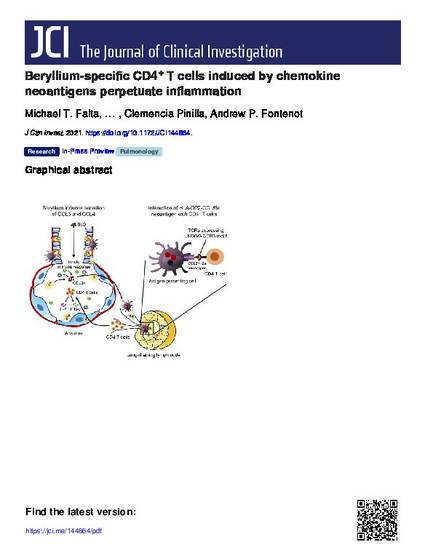
Discovering dominant epitopes for T cells, particularly CD4+ T cells, in human immune-mediated diseases remains a significant challenge. Here, we used bronchoalveolar lavage (BAL) cells from HLA-DP2-expressing patients with chronic beryllium disease (CBD), a debilitating granulomatous lung disorder characterized by accumulations of beryllium (Be)-specific CD4+ T cells in the lung. We discovered lung resident CD4+ T cells that expressed a disease-specific public CDR3β T cell receptor motif and were specific to Be-modified self-peptides derived from C-C motif ligands 4 (CCL4) and 3 (CCL3). HLA-DP2-CCL/Be tetramer staining confirmed that these chemokine-derived peptides represented major antigenic targets in CBD. Furthermore, Be induced CCL3 and 4 secretion in the lungs of mice and humans. In a murine model of CBD, the addition of LPS to Be oxide exposure enhanced CCL4 and CCL3 secretion in the lung and significantly increased the number and percentage of CD4+ T cells specific for the HLA-DP2-CCL/Be epitope. Thus, we demonstrate a direct link between Be-induced innate production of chemokines and the development of a robust adaptive immune response to those same chemokines presented as Be-modified self-peptides, creating a vicious cycle of innate and adaptive immune activation.
Available at: http://works.bepress.com/radleigh-santos/49/

The authors thank the Flow Cytometry Shared Resource and the Genomics and Microarray Shared Resource at the University of Colorado Cancer Center. The authors also thank the Santiago lab for use of their PCR machines and Todd Egan for assistance with bioinformatic processing of single cell sequencing data. This work was supported by National Institutes of Health grants (HL62410, HL152756, HL102245, and ES025534) to A.P.F